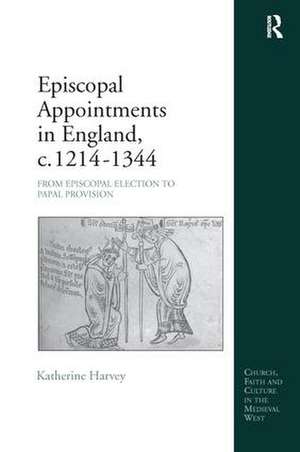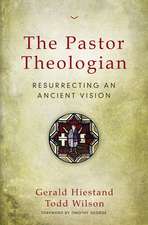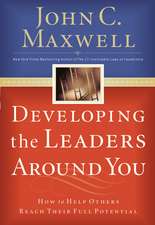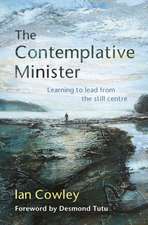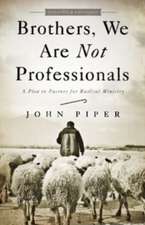Episcopal Appointments in England, c. 1214–1344: From Episcopal Election to Papal Provision: Church, Faith and Culture in the Medieval West
Autor Katherine Harveyen Limba Engleză Paperback – 9 sep 2016
| Toate formatele și edițiile | Preț | Express |
|---|---|---|
| Paperback (1) | 469.34 lei 6-8 săpt. | |
| Taylor & Francis – 9 sep 2016 | 469.34 lei 6-8 săpt. | |
| Hardback (1) | 1067.14 lei 6-8 săpt. | |
| Taylor & Francis – 10 ian 2014 | 1067.14 lei 6-8 săpt. |
Din seria Church, Faith and Culture in the Medieval West
- 9%
 Preț: 936.25 lei
Preț: 936.25 lei -
 Preț: 529.38 lei
Preț: 529.38 lei -
 Preț: 341.55 lei
Preț: 341.55 lei -
 Preț: 489.26 lei
Preț: 489.26 lei - 17%
 Preț: 259.98 lei
Preț: 259.98 lei - 18%
 Preț: 1054.71 lei
Preț: 1054.71 lei -
 Preț: 389.66 lei
Preț: 389.66 lei -
 Preț: 469.34 lei
Preț: 469.34 lei - 18%
 Preț: 1054.71 lei
Preț: 1054.71 lei - 18%
 Preț: 1059.45 lei
Preț: 1059.45 lei -
 Preț: 398.18 lei
Preț: 398.18 lei - 18%
 Preț: 1111.51 lei
Preț: 1111.51 lei -
 Preț: 389.38 lei
Preț: 389.38 lei - 26%
 Preț: 764.20 lei
Preț: 764.20 lei - 18%
 Preț: 1071.27 lei
Preț: 1071.27 lei - 18%
 Preț: 1072.88 lei
Preț: 1072.88 lei - 18%
 Preț: 1062.62 lei
Preț: 1062.62 lei - 26%
 Preț: 765.43 lei
Preț: 765.43 lei - 18%
 Preț: 1054.71 lei
Preț: 1054.71 lei - 18%
 Preț: 1054.71 lei
Preț: 1054.71 lei - 25%
 Preț: 826.01 lei
Preț: 826.01 lei - 26%
 Preț: 848.96 lei
Preț: 848.96 lei - 18%
 Preț: 1068.15 lei
Preț: 1068.15 lei - 25%
 Preț: 770.26 lei
Preț: 770.26 lei -
 Preț: 389.66 lei
Preț: 389.66 lei - 18%
 Preț: 1054.71 lei
Preț: 1054.71 lei - 25%
 Preț: 823.99 lei
Preț: 823.99 lei - 17%
 Preț: 259.98 lei
Preț: 259.98 lei - 18%
 Preț: 1000.27 lei
Preț: 1000.27 lei - 18%
 Preț: 1065.78 lei
Preț: 1065.78 lei -
 Preț: 489.26 lei
Preț: 489.26 lei - 18%
 Preț: 1000.27 lei
Preț: 1000.27 lei - 18%
 Preț: 1054.71 lei
Preț: 1054.71 lei - 18%
 Preț: 1000.27 lei
Preț: 1000.27 lei - 18%
 Preț: 1109.18 lei
Preț: 1109.18 lei - 18%
 Preț: 1057.09 lei
Preț: 1057.09 lei - 18%
 Preț: 1007.36 lei
Preț: 1007.36 lei - 16%
 Preț: 251.54 lei
Preț: 251.54 lei - 18%
 Preț: 1119.52 lei
Preț: 1119.52 lei
Preț: 469.34 lei
Nou
Puncte Express: 704
Preț estimativ în valută:
89.82€ • 93.53$ • 75.91£
89.82€ • 93.53$ • 75.91£
Carte tipărită la comandă
Livrare economică 10-24 martie
Preluare comenzi: 021 569.72.76
Specificații
ISBN-13: 9781138250093
ISBN-10: 1138250090
Pagini: 352
Dimensiuni: 156 x 234 x 30 mm
Greutate: 0.45 kg
Ediția:1
Editura: Taylor & Francis
Colecția Routledge
Seria Church, Faith and Culture in the Medieval West
Locul publicării:Oxford, United Kingdom
ISBN-10: 1138250090
Pagini: 352
Dimensiuni: 156 x 234 x 30 mm
Greutate: 0.45 kg
Ediția:1
Editura: Taylor & Francis
Colecția Routledge
Seria Church, Faith and Culture in the Medieval West
Locul publicării:Oxford, United Kingdom
Notă biografică
Katherine Harvey is Associate Lecturer in Medieval History at Birkbeck University of London.
Recenzii
’This is a useful and informative volume, which illuminates a complex element in the ’constitutional’ arrangements of the English church of the thirteenth and early fourteenth centuries. It fits well with other recent work on the period’s ecclesiastical history, contributing to the major re-examination and re-evaluation that seems to be under way.’ History ’The author has taken a rather unfashionable topic and shown how much may still be made of it. The constitutional history of the church can hardly compete in voguishness with, say, the lives and afterlives of the saints, but Harvey has shown that it is a seam that is far from exhausted. Exceptionally well ordered, and written with graceful clarity, her book deserves our gratitude and its author praise.’ English Historical Review
Cuprins
Introduction; 1: The Age of Election; 1: The Theory of Election; 2: The Custom of Election: Ritual and Finance; 3: The Practice and Problems of Episcopal Election, c.1214-c.1307; 2: The Age of Provision; 4: The Age of Provision: Canon Law and Custom; 5: The Age of Provision: Responses and Consequences; 3: The European Context; 6: Episcopal Appointments in a European Context; Conclusion
Descriere
Bishops were central figures in medieval society and the circumstances of their appointments are of great historical importance. This book considers the theory and practice of free canonical election in its heyday under Henry III and Edward I, and the nature of and reasons for the subsequent transition to papal provision. An analysis of the theoretical evidence for this subject (including canon law, royal pronouncements and Lawrence of Somercote’s remarkable 1254 tract on episcopal elections) is combined with a consideration of the means by which bishops were created during the reigns of Henry III and the three Edwards.
